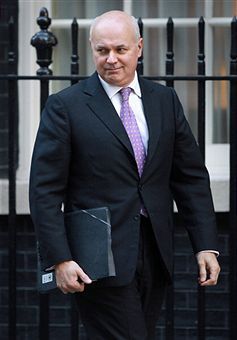 This morning’s welfare
event was one of the great “Who’da thunk it?” moments of this government so far. Here we had the Lib Dem leader providing backing vocals for a former Tory leader who has not only
become a minister, but who is implementing an agenda that only a few months ago was little more than an idea in a think-tank report. Reviewing that Centre for Social Justice report for Coffee House at the time, I said it deserved to influence welfare policy
for years to come. Now, it looks as though it will do just that. The immensity of Iain Duncan Smith’s achievement should not be underestimated.
This morning’s welfare
event was one of the great “Who’da thunk it?” moments of this government so far. Here we had the Lib Dem leader providing backing vocals for a former Tory leader who has not only
become a minister, but who is implementing an agenda that only a few months ago was little more than an idea in a think-tank report. Reviewing that Centre for Social Justice report for Coffee House at the time, I said it deserved to influence welfare policy
for years to come. Now, it looks as though it will do just that. The immensity of Iain Duncan Smith’s achievement should not be underestimated.
No doubt, the path to a Universal Credit and a more robust version of workfare will be one that meanders into controversy. The tougher penalties for claimants who shirk opportunities to work will, like the housing and child benefit cuts, come up against opposition from a varied cast of players. But that should not be mistaken for wider public disapproval. As Paul Goodman writes on ConservativeHome, the coalition’s welfare reforms are only fuelling their popularity. The majority, it seems, agree with Nick when he says that, “The system has become a vehicle for offering cash compensation, rather than real chances of a better life.” They agree it needs fixing.
If there is any real impediment to the IDS plan then, to my mind, it comes not from organised resistance – but from Whitehall disorganisation. The Times reports (£), for instance, on concerns that a crucial Treasury computer system will be delayed beyond when the DWP wants to introduce its universal credit. And more teething problems will probably emerge when we sift through the actual White Paper later. But, for now, let us bask in the fact that the coalition is on the threshold of achieving something that is important and impressive in equal measure. Putting aside the public finances, this may well be their defining legacy.






Comments